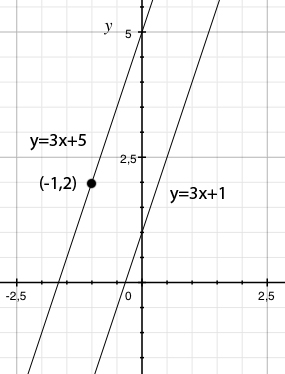Solution 2.2:5c
From Förberedande kurs i matematik 1
(Difference between revisions)
(Ny sida: {{NAVCONTENT_START}} <center> Bild:2_2_5c.gif </center> {{NAVCONTENT_STOP}}) |
m |
||
| (5 intermediate revisions not shown.) | |||
| Line 1: | Line 1: | ||
| - | {{ | + | Two straight lines are parallel if they have the same slope. From the line |
| - | <center> [[ | + | <math>y=3x+1</math>, we can read off that it has a slope of 3 (the coefficient in front of ''x''), and hence the equation we are looking for has an equation of the form |
| - | + | ||
| + | {{Displayed math||<math>y=3x+m\,,</math>}} | ||
| + | |||
| + | where ''m'' is a constant. The condition that the line should also contain the point (-1,2) means that the point should satisfy the equation of the line | ||
| + | |||
| + | {{Displayed math||<math>2=3\cdot (-1)+m\,,</math>}} | ||
| + | |||
| + | which gives <math>m=5</math>. Hence, the equation of the line is <math>y=3x+5</math>. | ||
| + | |||
| + | |||
| + | <center>[[Image:S1_2_2_5_c.jpg]]</center> | ||
Current revision
Two straight lines are parallel if they have the same slope. From the line \displaystyle y=3x+1, we can read off that it has a slope of 3 (the coefficient in front of x), and hence the equation we are looking for has an equation of the form
| \displaystyle y=3x+m\,, |
where m is a constant. The condition that the line should also contain the point (-1,2) means that the point should satisfy the equation of the line
| \displaystyle 2=3\cdot (-1)+m\,, |
which gives \displaystyle m=5. Hence, the equation of the line is \displaystyle y=3x+5.

